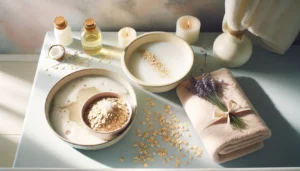Home Remedies for Hot Feet: Natural Solutions for Lasting Relief (2025 Guide)
Estimated reading time: 8 minutes
Key Takeaways
- Hot feet, characterized by a burning sensation, can stem from lifestyle factors like tight shoes or medical conditions like neuropathy.
- Simple natural remedies such as cool water soaks, Epsom salt baths, and aloe vera can provide quick relief.
- Lifestyle changes, including breathable footwear and hydration, help prevent recurring discomfort.
- Persistent symptoms or red flags like numbness warrant a doctor’s visit to rule out underlying issues.
Table of Contents
- Introduction
- Understanding Hot Feet
- Top Home Remedies for Hot Feet
- Recommended Products for Hot Feet Relief
- Lifestyle Changes to Prevent Hot Feet
- When to Seek Medical Help
- Frequently Asked Questions (FAQs) About Hot Feet
Introduction
Have you ever come home after a long day, kicked off your shoes, and felt an uncomfortable heat radiating from your feet? That burning sensation, often called hot feet, can disrupt your sleep, hinder your comfort, and make simple tasks feel daunting. At WikiHomeRemedies, we understand how this nagging issue can affect your daily life, and we’re here to help with safe, natural solutions grounded in science.
This article is your guide to easing hot feet with effective home remedies drawn from trusted research and real-world experience. Before we dive in, a quick note: while these suggestions aim to provide relief, persistent or severe symptoms warrant a chat with a healthcare professional. We’ll walk you through the causes behind hot feet, share step-by-step natural remedies, offer lifestyle tweaks for prevention, and highlight when it’s time to seek medical advice. Whether it’s discomfort from standing all day or an underlying issue, our goal is to empower you with practical knowledge. Let’s explore how nature’s healing touch can cool your feet and restore your ease. For related foot care concerns, check out our guide on natural relief for plantar fasciitis.
Understanding Hot Feet
What Are Hot Feet?
Hot feet describe that unsettling warmth or burning feeling in your feet, often leaving you restless at night or uneasy during the day. It’s not just about temperature; it can signal something deeper, ranging from tired muscles to medical concerns. Many people experience this after hours on their feet, but for some, it lingers without a clear reason.
This sensation might strike after wearing tight shoes on a sweltering day or during quiet moments when you’re trying to unwind. It’s a common complaint, with millions facing similar discomfort, according to insights from sources like WebMD. Knowing what hot feet feel like is the first step to finding relief.
Common Causes of Hot Feet
Several factors can spark this heated discomfort. Let’s break down the primary culprits behind hot feet so you can pinpoint what might be affecting you.
- Medical Conditions: Issues like neuropathy, often linked to diabetes, can cause nerve-related burning, impacting over 30% of diabetic individuals as per Mayo Clinic data. Poor circulation or conditions like athlete’s foot also play a role.
- Lifestyle Factors: Standing for hours, especially in tight or non-breathable footwear, traps heat and strain. Exposure to hot environments, like walking on sunbaked pavement, adds to the problem.
- Nutritional Gaps: A lack of certain nutrients, particularly Vitamin B, can contribute to nerve irritation and that fiery feeling in your feet, noted by health experts on platforms like Healthline.
Identifying the trigger behind your hot feet isn’t just about curiosity—it’s key to tackling the issue effectively. Each cause points to a different path for relief, whether it’s a simple fix or a doctor’s input. For related issues like fungal infections that may contribute to discomfort, see our post on natural solutions for fungal toenails.
Why Understanding the Cause Matters
Grasping why your feet feel hot helps you choose the right remedy rather than guessing in the dark. If it’s a matter of tight shoes, a quick swap to breathable options might solve it. But if it’s tied to something like diabetes, ignoring it could delay necessary care. Research from the Cleveland Clinic emphasizes that untreated causes, especially nerve-related ones, can worsen over time. Let’s use this knowledge as a foundation to explore natural solutions that match your specific needs, ensuring you’re not just masking the heat but addressing its source.
Top Home Remedies for Hot Feet
Finding relief from hot feet doesn’t have to mean reaching for over-the-counter fixes. Nature offers a wealth of accessible solutions, many of which you likely already have at home. Backed by science and trusted through generations, these remedies focus on cooling, soothing, and reducing inflammation. Below, we detail seven practical approaches with clear steps and safety tips to help you ease that burning sensation. Let’s dive into these time-tested methods to bring comfort back to your feet.
Cool Water or Ice Pack Soak
A simple dip in cool water can work wonders for hot feet by lowering the temperature and calming irritation. This method is particularly helpful after a long day of standing or exposure to heat. Studies suggest that cold therapy reduces swelling and numbs mild discomfort effectively.
To try this, fill a basin with cool water, ideally around 60°F (15°C), and soak your feet for 10 to 15 minutes. For an extra cooling boost, wrap an ice pack in a thin cloth and rest it on your feet for 5 minutes, ensuring you don’t apply ice directly to avoid skin damage. Limit this to a few times a day to prevent over-cooling, and stop if you feel numbness.
Epsom Salt Foot Bath
Epsom salt, rich in magnesium, offers a relaxing soak that can ease tension and reduce heat in your feet. Medical News Today highlights magnesium’s role in calming muscles and nerves, making this a go-to for many. It’s a gentle way to unwind while addressing discomfort.
Dissolve half a cup of Epsom salt in a basin of warm water—not hot, around 98°F (37°C)—and soak your feet for 15 to 20 minutes. Stir occasionally to keep the salt mixed. Rinse with cool water afterward to refresh. Use this 2 to 3 times a week, but avoid if you have open sores, as it might irritate them.
Aloe Vera Application
Aloe vera’s natural gel cools on contact and fights inflammation, a perfect match for burning feet. Its properties, noted by Healthline, have been used for skin relief across cultures. If heat leaves your feet feeling raw, this plant-based option can soothe swiftly.
Scoop fresh gel from an aloe leaf or use a pure store-bought version. Apply a thin layer to clean, dry feet, focusing on hot spots. Let it sit for 20 minutes before rinsing with cool water. Repeat twice daily, storing unused gel in a cool place. Test on a small area first to rule out sensitivity. For more on aloe’s benefits for skin irritations, explore our guide on remedies for sunburn.
Turmeric Paste
Turmeric carries curcumin, known for curbing inflammation and protecting against oxidative stress, as per research on PubMed. When made into a paste, it can lessen the burning tied to swollen or irritated feet. It’s a vibrant, natural tool for relief.
Mix a teaspoon of turmeric powder with a little water to form a thick paste. Gently rub it onto your feet, covering heated areas, and leave it for 15 minutes. Wash off with lukewarm water to avoid staining. Use once daily, wearing old socks afterward if needed, and avoid on cuts to prevent stinging.
Peppermint Oil Massage
Peppermint oil delivers a cooling tingle thanks to menthol, which also boosts blood flow to ease heat buildup. Studies on platforms like Healthline praise its refreshing effect on tired limbs. A light massage with this oil doubles as relaxation and remedy.
Dilute 5 drops of peppermint essential oil with a tablespoon of carrier oil like coconut. Massage into your feet for 5 to 10 minutes, focusing on soles and toes. Wipe off excess with a damp cloth. Use once daily, avoiding broken skin, and store the mix in a dark bottle for freshness.
Apple Cider Vinegar Soak
Apple cider vinegar balances skin pH and may soothe burning by reducing irritation, a remedy often cited on wellness sites like WebMD. Its mild acidity can refresh overheated feet. This pantry staple turns into a simple foot bath for quick comfort.
Add a cup of raw apple cider vinegar to a basin of cool water. Soak your feet for 15 minutes, patting dry afterward. Repeat 2 to 3 times weekly to calm persistent heat sensations. Dilute properly to avoid skin dryness, and skip this if you notice any stinging or redness.
Ginger Tea Compress
Ginger’s anti-inflammatory strength, backed by research from sources like the NIH, makes it a warming yet cooling ally for hot feet. A compress using ginger tea targets discomfort directly. It’s an easy brew that brings nature’s spice to your aid.
Boil a tablespoon of grated fresh ginger in two cups of water for 10 minutes, then cool it to a lukewarm state. Soak a clean cloth in the liquid, wring it out, and apply to your feet for 10 minutes. Reapply if needed, using this method once daily. Ensure the temperature isn’t too warm to avoid worsening the heat.
These remedies offer immediate ways to cool and comfort your feet, drawing from household items and nature’s bounty. Pair them with the lifestyle shifts we’ll discuss next to build a foundation for lasting relief. If one method resonates more with your symptoms, start there and adjust as you observe what works best.
Recommended Products for Hot Feet Relief
While natural remedies form the heart of easing hot feet, certain products can amplify your comfort and support ongoing care. At WikiHomeRemedies, we’ve curated a few trusted options that align with the soothing principles of our home solutions. These tools complement the cooling soaks and pastes you’ve just explored, offering practical additions to your routine. Below, we share three placeholders for products that can enhance relief—specific recommendations will be updated upon request with detailed benefits and sourcing guidance.
Product 1 [Placeholder]
This first item focuses on delivering targeted cooling for overheated feet. Designed to mimic the refreshing effect of a cool soak, it’s ideal for quick use after long hours on your feet. We’ll detail how it supports natural remedies once specifics are provided, alongside where you can find it for your convenience.
Product 2 [Placeholder]
Our second selection aims to support foot relaxation through ingredients or features akin to herbal relief like peppermint or aloe. It’s crafted for daily incorporation, enhancing the calming rituals of massages or soaks. Full insights on its application and benefits will follow with updated information.
Product 3 [Placeholder]
Lastly, this product emphasizes sustained comfort, possibly through materials or formulas that prevent heat buildup over time. It ties into the preventative focus of our lifestyle tips, acting as a companion to natural care. Look for a complete review and purchase options once we finalize the details.
These products are meant to work hand-in-hand with the remedies and habits we advocate, ensuring you have a full toolkit for foot wellness. As we refine this list with specific items, we’ll prioritize options backed by user trust and aligned with nature’s healing ethos. Stay tuned for visuals and direct links to make integrating these into your life seamless.
Lifestyle Changes to Prevent Hot Feet
Relief from hot feet doesn’t stop at remedies; building habits that prevent the heat from returning is just as vital. At WikiHomeRemedies, we believe small, sustainable shifts in your daily routine can create lasting comfort. Let’s explore practical ways to protect your feet through choices in footwear, nutrition, personal care, and even your surroundings. These steps, supported by insights from sources like the Cleveland Clinic, aim to cool your feet for the long haul.
Footwear Tips for Comfort
What you wear on your feet matters immensely. Opt for shoes made of breathable materials like leather or mesh to let air circulate, reducing trapped heat. Ensure proper sizing—tight fits squeeze blood flow, worsening warmth—while avoiding synthetic fabrics that don’t wick moisture.
Cotton or wool socks can absorb sweat better than nylon, a switch that’s helped many, per podiatrist advice. If you’re on your feet often, consider supportive insoles to ease strain. These choices can turn a scorching day into a manageable one. For more on footwear and foot health, read our detailed guide on plantar fascia relief.
Hydration and Diet for Foot Health
Keeping your body hydrated directly impacts how your feet feel. Dehydration thickens blood, slowing circulation and raising heat, so aim for 8 glasses of water daily, or about 2 liters (0.5 gallons). Foods rich in anti-inflammatory properties, like salmon with omega-3s or spinach packed with Vitamin B, support nerve health, as studies on WebMD confirm.
A balanced plate with berries or nuts can curb swelling that adds to discomfort. Sip water throughout the day and weave these nutrients into meals to keep your feet refreshed from within.
Foot Care Habits to Reduce Heat
Simple routines can stop heat before it starts. Elevate your feet on a pillow for 10 minutes after standing to boost blood flow away from pressure points. Avoid staying on your feet too long without breaks—set a timer if needed—and massage them lightly each evening to release tension.
These habits, backed by health experts, prevent heat buildup over time. Even a quick rinse with cool water before bed can reset your feet. Make these small acts part of your day for noticeable ease.
Environmental Adjustments for Cooler Feet
Your surroundings play a role in foot temperature. Steer clear of walking barefoot on hot surfaces like asphalt or tile in summer; use sandals or slippers instead. Cooling mats or gel socks, worn at home, can maintain a lower temperature, a tip often shared in wellness forums.
If heat lingers in your space, position a fan near your feet while resting. These tweaks ensure your environment isn’t adding to the problem, paving the way for cooler, happier steps.
By weaving these changes into your life, you’re not just reacting to hot feet but stopping them before they flare up. They build on the remedies we’ve shared, creating a cycle of care. If discomfort persists despite these efforts, it might hint at deeper issues, which we’ll cover next.
When to Seek Medical Help
While home remedies and lifestyle shifts can ease hot feet for many, sometimes the burning sensation signals a need for professional insight. At WikiHomeRemedies, we encourage you to trust your instincts—if something feels off, seeking help is a wise, proactive choice. Let’s look at symptoms that call for a doctor’s attention and what they might mean. With guidance drawn from reputable sources like the Mayo Clinic, we aim to keep you informed and supported.
Red Flags to Watch For
Certain signs suggest it’s time to move beyond home care. If the burning in your feet doesn’t fade after a week of remedies, or if it worsens, don’t delay a check-up. Watch for numbness, tingling, swelling, or any visible changes like redness or sores that won’t heal.
Nighttime heat that disrupts sleep or pain spreading to your legs are also concerns. If you notice signs of infection, such as pus or fever alongside foot discomfort, reach out to a healthcare provider promptly. These markers, often cited by the NIH, indicate your body might need more than natural solutions.
Possible Underlying Conditions
Persistent hot feet can point to serious health issues worth exploring with a doctor. Diabetic neuropathy, affecting over 50% of those with diabetes per NIH data, damages nerves leading to burning sensations. Peripheral artery disease, where blood flow narrows, can also trap heat in limbs.
Other possibilities include thyroid imbalances or chronic inflammation. Experiencing these symptoms after weeks of no relief, like a patient who ignored ongoing discomfort only to discover a circulatory issue, underlines why early evaluation matters. A healthcare professional can run tests to pinpoint the cause and guide next steps. For more on managing related nerve discomfort, see our article on natural remedies for nail fungus.
Taking action isn’t about worry—it’s about caring for your well-being with the same patience you’ve shown in trying natural remedies. Hot feet might be a small clue to a larger picture, and addressing it with medical support ensures you’re on the safest path. Use this as a reminder that your health deserves every layer of attention.
Frequently Asked Questions (FAQs) About Hot Feet
Navigating hot feet often brings up questions, and we’re here at WikiHomeRemedies to clarify with straightforward, evidence-based answers. Below, we tackle common concerns to round out your understanding and ease any lingering doubts. If something still puzzles you, feel free to share your thoughts in the comments—we’re eager to help.
- Why do my feet feel hot at night? This often ties to poor circulation or nerve irritation, exacerbated by lying still, as noted by Healthline. Elevating feet or a cool rinse before bed can help. If it persists, consult a doctor for deeper causes.
- Are hot feet a sign of diabetes? They can be, especially if paired with numbness, due to diabetic neuropathy impacting millions, per Mayo Clinic stats. Monitor for other signs like thirst or fatigue and seek medical advice for clarity.
- How long should I soak my feet for relief? Aim for 10 to 20 minutes in cool water or solutions like Epsom salt. Overdoing it might dry skin, so pat dry and moisturize after. Adjust based on comfort.
- Can stress cause hot feet? Yes, stress triggers adrenaline, which can constrict blood vessels and heat feet, per wellness insights. Relaxation techniques or a peppermint massage might ease this. Persistent issues need a broader look.
- What vitamins help with burning feet? Vitamin B, especially B12, supports nerve health, often linked to reduced burning, as WebMD suggests. Include eggs, fish, or supplements after a doctor’s nod to address deficiencies.
These answers pull together the causes, remedies, and warnings we’ve discussed, ensuring you have a full picture. Hot feet don’t have to linger as a mystery—armed with this knowledge, you’re ready to cool down naturally or seek the right help when needed.










